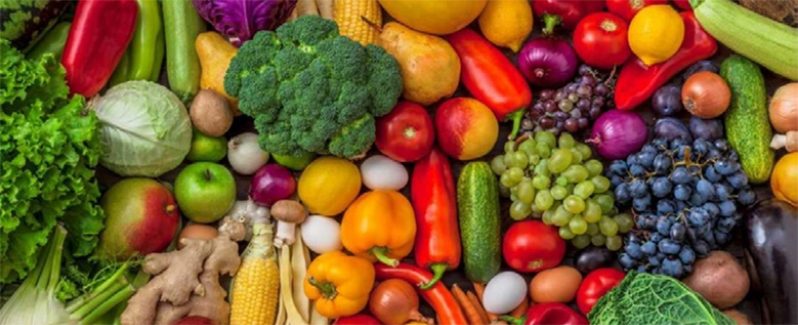THE Year 2021, has been designated by the United Nations (UN) General Assembly as the International Year of Fruits and Vegetables (IYFV). The IYFV is a unique opportunity to raise awareness of the important role of fruits and vegetables in human nutrition, food security and health, as well as in achieving the UN’s Sustainable Development Goals.
It is dedicated to raising awareness about the important role of fruits and vegetables in human nutrition, food security and health.
Fruits and vegetables are good sources of dietary fibre, vitamins and minerals and beneficial phytochemicals.
The Food and Agriculture Organization of the United Nations (FAO) and the World Health Organization (WHO) recommend that each adult consumes at least 400 grams of fruit and vegetables on a daily basis to prevent chronic diseases, such as cancer, diabetes, heart disease and obesity, as well as to counter micronutrient deficiencies.
With the COVID-19 pandemic the need to transform and rebalance the way our food is produced and consumed has only been further stressed.
However, Director of the Food and Agriculture Organisation here in Guyana, Dr Gillian Smith, spoke with Pepperpot Magazine and gave a brief overview of the significance of the observances and their implications for us as Guyanese.
“We are happy that the government has embraced this observance and has launched a programme of activities which we are supporting. We share the same views as Minister Mustapha that the IYFV promotes diversified, balanced and healthy lifestyles through fruits and vegetable consumption, raise awareness of food-safety issues, standards and guidelines for the production, handling, storage, and processing of fruits and vegetables”, Dr Smith related.
Dr Smith further alluded to the importance of fruits and vegetables on daily dietary level as a country.
“In Guyana, obesity is a growing problem in the adolescent and adult population. Approximately 41% of males and 56.5% of females age 18 years and above are considered overweight, ” Dr Smith contended.
According to the Ministry of Health and Global School-based Student Health Survey – 71 % of Guyanese schoolchildren consume carbonated soft drinks daily and 56 % consume fast food on a weekly basis.
These numbers rank above the average in South America and the world. Observances such as this will raise awareness of the issues and help us to work together to encourage more consumption of healthier diets rich in fruits and vegetables, our experts believe.
According to the FAO and the WHO, we need a minimum of 400 grams of fruits and vegetables in our diets daily for the prevention of chronic diseases such as heart disease, cancer, diabetes, and obesity, as well as for the prevention and alleviation of several micronutrient deficiencies, especially in less developed countries.
In Guyana, Only 25 % of school-aged children ages 12-17 consume fruits daily while only 17 percent consume vegetables each day. These statistics tell us we need to do more to encourage more fruits and vegetable consumption.
For this reason, FAO launched the social media challenges to target the younger generation who are falling below in the consumption of fruits and vegetables.
Food loss also remains high on the priority of the Food and Agriculture Organisation (FAO).
To this end, Dr Smith contended that food wastage in the Region has continued throughout the pandemic. As producers or consumers, we have a responsibility to reduce food waste for the sake of our environment. By re-thinking the way we treat and utilise fruits and vegetables, we can significantly reduce food wastage at home.
Globally, about 1 300 million tonnes of food, including 30% of cereals, between 40 and 50% roots, fruits, vegetables and oilseeds, 20% of meat and dairy products and 35% of the fish are lost annually. FAO estimates that such foods would be enough to feed 2 000,000 people.
FAO also estimated that 6% of these global food losses occur in Latin America and the Caribbean and the Region lost each year and/or wasted about 15% of their food available, even though 47 million people still suffer from hunger.
This is one of the great remaining challenges to achieving full food security. These cumulative environmental impacts produce a food-wastage carbon footprint of 540kg of CO2 per capita in the Latin America and Caribbean (LAC) region— the fourth-highest carbon footprint associated with food wastage in the world, and the highest in the developing world.
At the household level, food wastage can eat into the budget of families, while at the business level it can significantly reduce profit margins. Food loss in agricultural production reduces efficiency, drives up costs and unnecessarily depletes natural resources. Therefore, working to reduce waste will help to make the country more competitive and healthy.
The FAO in Latin America and the Caribbean has issued a series of activities, events and publications to share this unique relationship with fruits and vegetables and to raise awareness on the important role of fruits and vegetables in human nutrition, food security and health and reducing food loss and wastage, so that the world can work together to achieve the UN Sustainable Development Goals.



.jpg)








